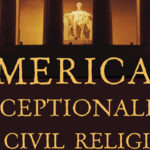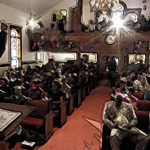"American exceptionalism" has crept into campaign rhetoric and also is proliferated by Christians. Isn't it an expression of civil religion that can turn our nation into an idol?

|
Everyone wants to be exceptional. Italians view themselves as exceptional because Rome is central to the history of Christianity and the world. The English think they have been favored by God because they are set apart from the continents as an island nation. The Spanish point to their role in the discovery of the New World as evidence of divine favor. The French think Providence has given them "an eminent and exceptional destiny" due to the grandeur of their civilization and their leadership in promoting human rights. Americans like to think of themselves as an exemplary nation, "a shining light on a hill," occupying a unique place in history as a model for the spread of Christianity and/or capitalism and/or democracy. Every nation wants to be exceptional.
There are at least two problems with the idea of the exceptionalism of any nation.
First, it presumes to look on human history with a foresight and comprehension possessed only by God. Biblically, there is no warrant for the idea that God made a covenant with any nation other than Israel. The new covenant is made with all nations and peoples (Isaiah 2:1-4; Micah 4:1-5). The kingdom of God is composed of "persons from every tribe and language and people and nation" (Revelation 5:9).
 Second, it promotes an idolatrous civil religion that turns God into a national mascot. The political rhetoric of exceptionalism invokes the name of God to summon a comforting deity who will unify the country by promoting patriotism and blessing the narrow and exclusive interests of a finite nation. The pride and glory of the nation, not the holy will of the infinite and transcendent God, reign supreme in this exchange.
Second, it promotes an idolatrous civil religion that turns God into a national mascot. The political rhetoric of exceptionalism invokes the name of God to summon a comforting deity who will unify the country by promoting patriotism and blessing the narrow and exclusive interests of a finite nation. The pride and glory of the nation, not the holy will of the infinite and transcendent God, reign supreme in this exchange.
The truth is, God is no respecter of either persons or nations. God does call people to exceptional service, and God does act in history to accomplish his redemptive purposes. In the Bible, the children of Israel were chosen, and their calling was to serve God by blessing others (Genesis 18:18). Election always is for service, not for glory or privilege.
Serving God always has required exceptional sacrifices, and it often leads to extraordinary suffering. The Messiah was a "suffering servant." The apostles were martyrs. The early church was persecuted. None of them had the appearance of being exceptional in the eyes of the world, but all of them were.
For signs of exceptionalism today, nationalities are the wrong place to look. Look where Jesus directed our attention. Look for transnational and cross-cultural ministries, where the needs of the hungry, the thirsty, the strangers, the naked, the sick and the imprisoned are met (Matthew 25:31-40).
Sign up for our weekly edition and get all our headlines in your inbox on Thursdays
Bruce Prescott, executive director
Mainstream Baptists of Oklahoma
Norman, Okla.
Right or Wrong? is co-sponsored by the Texas Baptist theological education office and Christian Life Commission. Send your questions about how to apply your faith to [email protected].














We seek to connect God’s story and God’s people around the world. To learn more about God’s story, click here.
Send comments and feedback to Eric Black, our editor. For comments to be published, please specify “letter to the editor.” Maximum length for publication is 300 words.